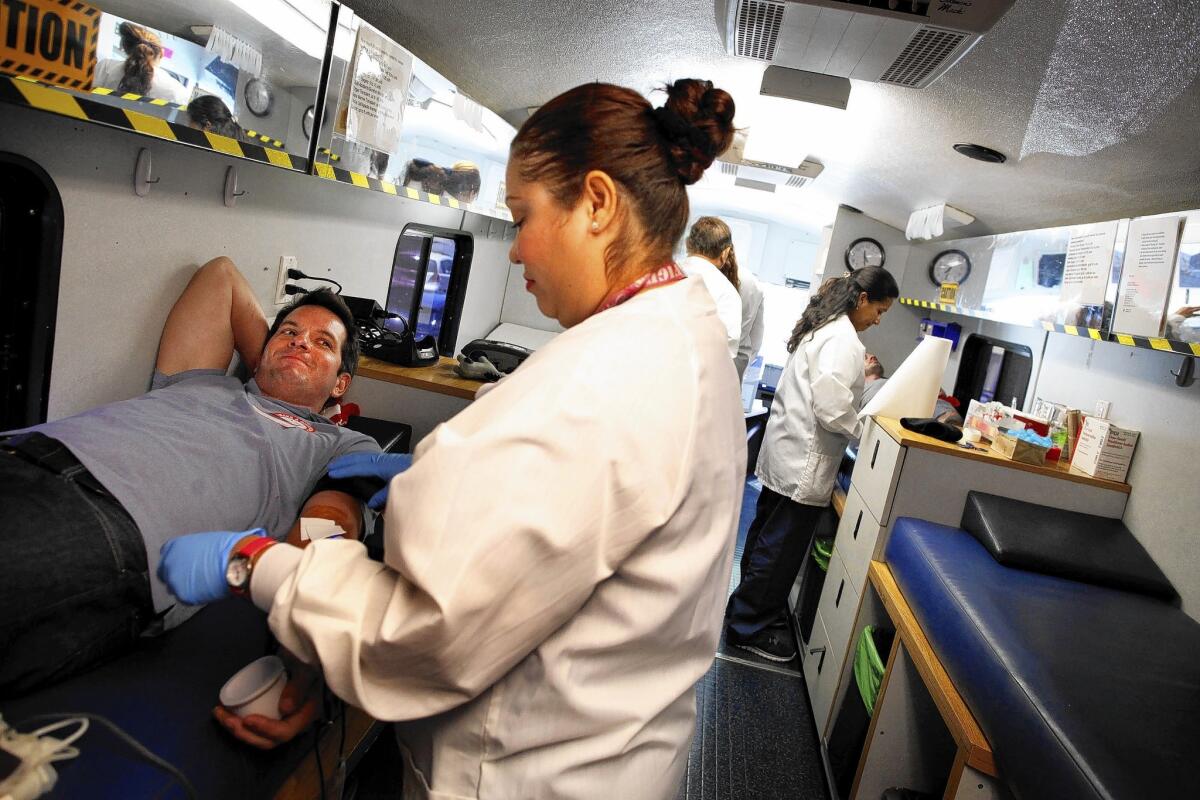Ban on gay blood donors is a civil rights issue, activists say

- Share via
When Ryan James Yezak’s workplace hosted a blood drive a few years back, he told his boss he would be happy to donate.
Then the West Hollywood resident found out that as a gay man, he was banned for life from giving blood under a federal regulation put in place before he was born.
“I felt like a different species,” he said of having to tell co-workers that he alone would be unable to participate. “I was completely alienated for no reason, because I was completely healthy.”
The experience prompted Yezak, now 27, to join the growing ranks of those fighting to end the ban instituted in the early days of the AIDS epidemic, when there was fear that HIV-infected blood could enter the nation’s medical supply. It applies not just to gay men, but to any man who has had sex at least once with another man since 1977.
Last year, the American Medical Assn. voted to oppose the policy, calling it “discriminatory and not based on sound science.”
The three groups that supply nearly all of the nation’s blood — the American Red Cross, AABB and America’s Blood Centers — have long advocated ending the ban.
Despite advances in testing, of people as well as of donated blood, the Food and Drug Administration has warned that introducing a population with a heightened risk of HIV into the pool increases the likelihood that someone who does not know he is infected will give.
The Centers for Disease Control and Prevention said that although men who have sex with men make up about 2% of the U.S. population, they accounted for 63% of all new HIV infections in 2010, the most recent year for which data are available. As the HIV rate was declining in other populations from 2008 to 2010, there was a 22% increase in diagnoses among gay and bisexual men ages 13 to 24 — of note, the FDA said, because young people are more likely to donate blood.
Still, even the FDA acknowledges that the risk of contracting HIV from donated blood is low — about one case per every 2 million units.
Yezak and others see easing the ban as a civil rights issue. They say it singles them out simply because they are gay, not because of individual risk factors.
Others who engage in risky sexual behavior are allowed to donate after a temporary deferral. Women or straight men who have had sex with someone with HIV or AIDS can give blood after waiting a year, as can people who have had sex with a prostitute.
A healthy gay man in a monogamous relationship — or a gay man who has been celibate since 1978 — cannot.
“One of the lingering consequences of this ban is that it supports the notion that only gay and bisexual men get HIV,” Yezak said.
After his own experience with the ban, Yezak started the National Gay Blood Drive, in which gay and bisexual men enlist eligible people to donate in their place. At drives held in 61 cities last month, they collected nearly 1,500 pints of blood.
After attending one such drive, San Francisco Supervisor Scott Wiener, who is gay, introduced a resolution calling on the FDA to change its policy. The San Francisco Board of Supervisors passed the measure last month.
Assemblyman Richard Bloom (D-Santa Monica) this month introduced a similar resolution in the state Legislature.
The U.S. Department of Health and Human Services, which oversees the FDA, is studying the effects of loosening the lifetime ban. A spokeswoman said the agency expected to finish “internal deliberations on a policy recommendation” this year.
Change is possible, the FDA has said, as long as blood recipients are not placed at a higher risk of getting HIV from transfusions. Lifetime bans have been lifted in several countries, including Italy and Spain. Last year, Canada decided to allow gay men to donate after five years of abstinence.
At the West Hollywood gay blood drive last month, a group gathered outside a Red Cross bus on Santa Monica Boulevard for a photo. The man holding the camera yelled: “Everybody, say blood!”
Then: “Everybody, say, ‘I wish they accepted my blood!’”
J.D. Wheeler, a registered nurse and organ transplant coordinator, said he was frustrated that he couldn’t donate because the need is so great.
“I doubt straight people in the hospital care if it’s gay blood,” Wheeler said. “They just need the blood.”
Twitter: @haileybranson
More to Read
Sign up for Essential California
The most important California stories and recommendations in your inbox every morning.
You may occasionally receive promotional content from the Los Angeles Times.











